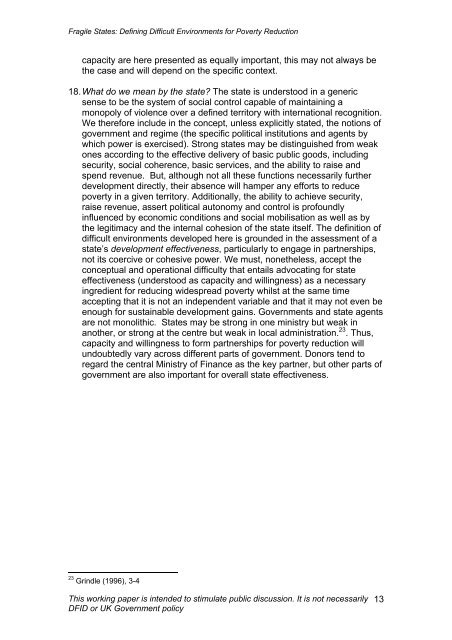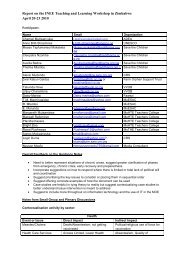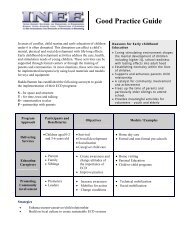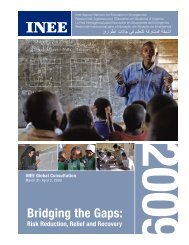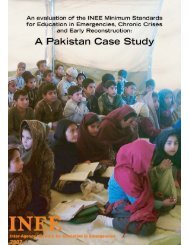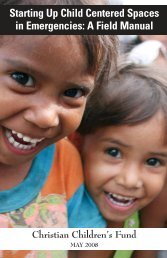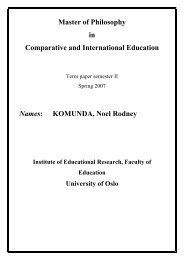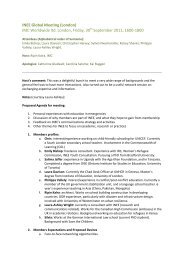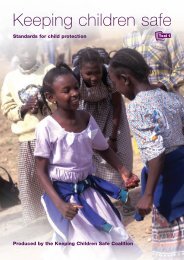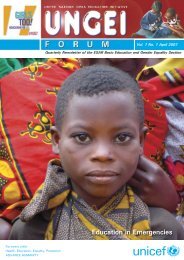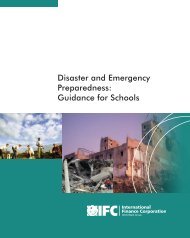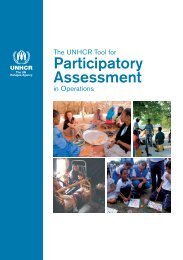Fragile States: Defining Difficult Environments for Poverty ... - INEE
Fragile States: Defining Difficult Environments for Poverty ... - INEE
Fragile States: Defining Difficult Environments for Poverty ... - INEE
Create successful ePaper yourself
Turn your PDF publications into a flip-book with our unique Google optimized e-Paper software.
<strong>Fragile</strong> <strong>States</strong>: <strong>Defining</strong> <strong>Difficult</strong> <strong>Environments</strong> <strong>for</strong> <strong>Poverty</strong> Reductioncapacity are here presented as equally important, this may not always bethe case and will depend on the specific context.18. What do we mean by the state? The state is understood in a genericsense to be the system of social control capable of maintaining amonopoly of violence over a defined territory with international recognition.We there<strong>for</strong>e include in the concept, unless explicitly stated, the notions ofgovernment and regime (the specific political institutions and agents bywhich power is exercised). Strong states may be distinguished from weakones according to the effective delivery of basic public goods, includingsecurity, social coherence, basic services, and the ability to raise andspend revenue. But, although not all these functions necessarily furtherdevelopment directly, their absence will hamper any ef<strong>for</strong>ts to reducepoverty in a given territory. Additionally, the ability to achieve security,raise revenue, assert political autonomy and control is profoundlyinfluenced by economic conditions and social mobilisation as well as bythe legitimacy and the internal cohesion of the state itself. The definition ofdifficult environments developed here is grounded in the assessment of astate’s development effectiveness, particularly to engage in partnerships,not its coercive or cohesive power. We must, nonetheless, accept theconceptual and operational difficulty that entails advocating <strong>for</strong> stateeffectiveness (understood as capacity and willingness) as a necessaryingredient <strong>for</strong> reducing widespread poverty whilst at the same timeaccepting that it is not an independent variable and that it may not even beenough <strong>for</strong> sustainable development gains. Governments and state agentsare not monolithic. <strong>States</strong> may be strong in one ministry but weak inanother, or strong at the centre but weak in local administration. 23 . Thus,capacity and willingness to <strong>for</strong>m partnerships <strong>for</strong> poverty reduction willundoubtedly vary across different parts of government. Donors tend toregard the central Ministry of Finance as the key partner, but other parts ofgovernment are also important <strong>for</strong> overall state effectiveness.23 Grindle (1996), 3-4This working paper is intended to stimulate public discussion. It is not necessarilyDFID or UK Government policy13


